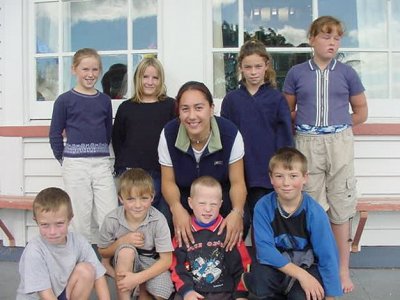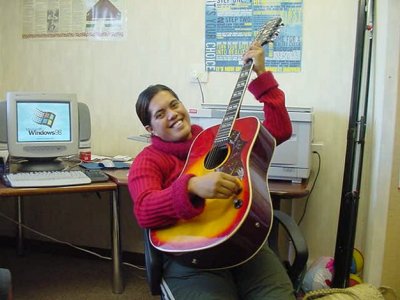

|
|

Lisa, Teacher Aide, Huirangi School
WHO and WHERE
AIM
PROGRAMME
While it is possible for community organizations to access subsidised workers through such schemes as Taskforce Green, the Foundation found that most were still unwilling to take up the government schemes. Their reluctance, in part, reflected their lack of confidence in becoming employers and administering things like PAYE and ACC, as well as assuming responsibilities associated with health and safety requirements. And most voluntary groups have found they do not have the money in their budget to bridge the gap between a Winz subsidy and the wages they have to pay a new worker.
Youthworks addresses these obstacles by: meeting individually with community organisations and making them aware of Youthworks; The young people get work experience and training as well as involvement with people and groups dedicated to community service. Community groups get the advantage of having a paid worker and the opportunity to up-skill themselves by accessing support to employ, train and supervise a young person. The community at large gets better service from community groups. At end of the placement, the Youthworks coordinator helps the young person find a non-subsidised job.
WHAT WE GAVE MONEY FOR
PROGRESS

Melissa Waitara Project - Administration/Mentoring Working towards National Certificate in Youthwork One of the Youthworks success stories is of a young man who had not worked for nearly three years. After only two weeks working he gained confidence, improved his appearance and vowed that he was never going back on the benefit. After six weeks on the scheme his younger, unemployed partner, secured part-time work and between them they are now employed and sharing childcare duties. This involved a lot of in-work support by the coordinator setting up meetings with the IRD to sort out child support, arranging non-beneficiary help from Winz, and generally helping a young family that had never been employed. After the completion of his Youthworks contract, the young man gained work in a supermarket and has recently been enrolled on a trainee manager course. PARTNERS and SUPPORTERS
THE YOUTHWORKS STORY SO FAR
SUMMARY THE PROJECT
With leadership provided by the mayor, Youthworks drew these threads
together and full time workers were provided for not for profit community
groups. The proposal did not seek to promote commercial objectives, its
aim was to increase community capacity and develop youth within the
community.
The Department of Work and Income agreed to partner the proposal and employ
a youth co-ordinator, and provide a wage subsidy through Taskforce Green.
At no cost to the scheme the Taranaki Support Foundation provided
assistance and training in employment matters and administration for the
community groups.
DIFFICULTIES
It became evident that the quality of the Work and Income staff member
working with the Trust was crucial to the success of the project.
Youthworks was fortunate to retain a quality worker for three and a half of
the four years of
the schemes operation.
Initially the top up payment offered was $40 per week per worker, however
with the increase in the minimum wage this was found insufficient and in
2004 the top up was increased to $60 per week. This has made the scheme
more attractive to community organisations.
CONCLUSION
119 young people have been appointed to the scheme as at December 2004.
All gained valuable experience and income from paid work. Sufficient
funding is available to cover the costs of a further 31 young workers.
With the range of skills gained, all but 5 have gone on to tertiary study
or unsubsidised employment. Many had "turned their life around" as a
result of the scheme and the employing not for profit community groups have
had the advantage of having a willing paid worker.
The community as a whole has benefited by having work done that would not
otherwise have been done and it has enhanced the service to clients that
the community groups can provide.
Most of the resources required for the scheme were already in place. What
was missing was the co-operation, collaboration and co-ordination of those
agencies and departments that have both the resources and the influence to
affect the future of young people. The Mayor and the Trust provided the
means to link these agencies and departments together.
The project was innovative and a first for New Zealand and is complimentary
to Government initiatives such as the Modern Apprenticeship Scheme and the
Youth Transitions Service. Taranaki, with an ageing population, has
benefited by retaining employed youth in the region.
Copies of complete report available from:
Elaine Gill
|

Taranaki Employment Support Foundation The Foundation's mission is to support Taranaki unemployed young people with opportunities for work, training and education.
 I'm a member of the Mayors Taskforce for Jobs, which has a simple goal. By the year 2005 every single New Zealander under the age of 25 will be in employment or training. The region has 1600 people in this age group registered unemployed. One of the deliverables we've set as a council in our 10-year strategic plan is that exact goal. There's no question we're on a roller coaster and I just want to make sure that every man, woman annd child is helped to jump onto it ... Peter Tennent, Mayor of New Plymouth
 Claire Stewart, former Mayor of New Plymouth ... Can you remember your first job and that wonderful feeling that you had when you received your first pay packet? Sadly many of our young people have never had that feeling as theyve never had the opportunity to have a real full time job... these are not young people who have left Taranaki to further their education never to return, instead they have stayed in New Plymouth and due to no fault of their own have been unable to get a job. But YOU can help and at the same time assist your community organisation... from the Mayors letter to Community Organisations
|